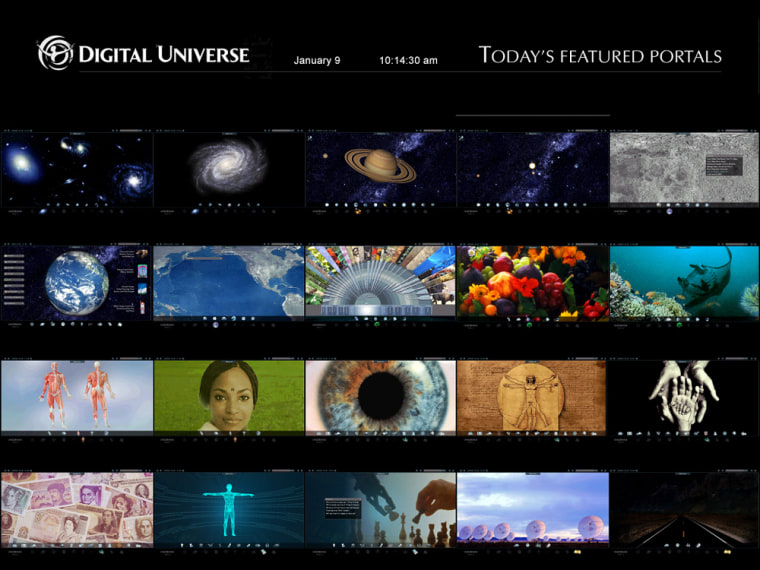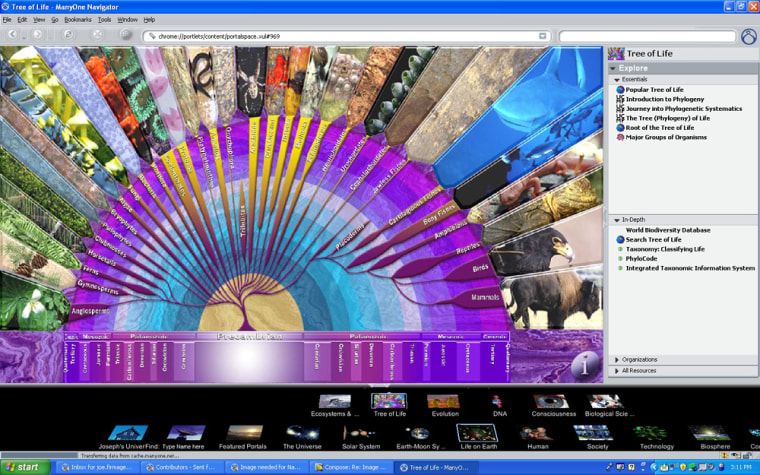A couple of years ago, when dot-com millionaire Joe Firmage first floated his idea for an expert-based “Encyclopedia Galactica” that would knit together all realms of knowledge in a clickable online world, you might have wondered whether the whole idea was just a science-fiction gimmick.
Then Wikipedia, the community-based online encyclopedia, blossomed on the Web. Google Earth, the search engine company's map-based interface for global imagery, made a huge splash. Looking back, Firmage’s idea might have just been ahead of its time.
Firmage and his collaborators say the Encyclopedia Galactica vision is ready for a pilot tryout, if not for prime time. On Tuesday, they officially took the wraps off their software project, now known as the Digital Universe. Will it turn out to be a nonprofit “PBS of the Web,” as Firmage and his collaborators hope? Stay tuned: Even Firmage admits it might take years for the idea to catch on.
“I and all those that we work with would be absolutely delighted to see that somewhere between 10 and 20 percent of the public regularly uses the Digital Universe within the next 10 years,” Firmage told MSNBC.com. “I would characterize that as very healthy success.”
Firmage’s success in the computer industry goes back more than a decade, to his role in founding such companies as Serius Corp. and USWeb. That's how he earned his millions — but in the late 1990s, he made the transition to less commercial pursuits, ranging from UFO studies to the Cosmos 1 solar-sail mission.
It all started with ‘Cosmos’
Firmage, 35, said the inspiration for the Digital Universe goes back to his childhood, when his father sat him down to watch astronomer Carl Sagan's "Cosmos" TV series. During one of the episodes, Sagan speculated on the future development of an Encyclopedia Galactica in which all of Earth's history would be written.
"I was totally hooked," Firmage recalled, "and it transformed my life."
In the wake of his dot-com success, Firmage went into partnership with Sagan's widow, Ann Druyan, to create Cosmos Studios — and he also started working on turning the Encyclopedia Galactica into a reality.
Over the past few years, Firmage has been refining the idea with the aid of experts such as Wikipedia co-founder Larry Sanger and astrophysicist Bernard Haisch. A constellation of universities, corporations and nonprofit groups — including NASA, ESRI and the National Council for Science and the Environment — agreed to participate.
Firmage said $10.5 million has been spent developing the project since 2002.
Encyclopedic precedents
In addition to Encyclopedia Galactica, the Digital Universe draws upon Sanger's concept of a "Nupedia" that would create thoroughly vetted articles on a wide variety of subjects and put them online — like Wikipedia, but with academic peer review. The original Nupedia concept fizzled under the weight of its own red tape, but it helped shape the development of the Digital Universe.
Haisch said the recent controversy over a faked Wikipedia entry reinforced the need for expert oversight. "We're going to try to avoid those pitfalls by recognizing expertise and by requiring that contributors use their real names," he said.
The Digital Universe would still have a place for content submitted by the public, "which we welcome, but which will be labeled unvetted public material, separated from the contributions of experts," Haisch said.
"So this curious timing about Wikipedia has benefited us in a surprising way," he said.
Even Wikipedia is evolving in the wake of the recent flap, and its record holds up pretty well in comparison with traditional information sources such as Encyclopedia Brittanica. Wikipedia's lead founder, Jimmy Wales, told MSNBC.com that he didn't know much about the Digital Universe's development, but said it would be a mistake to cast the quest for accuracy in terms of insiders vs. outsiders.
"That's a big error to assume that there’s any tension between the two, that it’s experts vs. community," Wales insisted. "There are experts in the community."
Recruiting the stewards
For years now, Digital Universe has been enlisting a cadre of expert "stewards" from the academic community, to supervise information portals on a wide variety of subjects. One of the stewards is climate specialist Robert Corell, who presided over the National Science Foundation's Earth sciences program for 13 years and is now organizing the Digital Universe's information on Arctic climate.
Corell told MSNBC.com that he gladly answered the call: "I said this is absolutely what is needed in the world of the Internet, because so many colleagues would call me and say, 'Bob, such-and-such on the Internet is garbage," he recalled.
The stewards for the broadest areas — the cosmos, the natural world and human health — can in turn enlist others to steward subcategories, and so on. Corell said the Digital Universe would handle controversies such as the global warming debate much as they're handled in the academic world. For example, if Richard Lindzen, a meteorologist at the Massachusetts Institute of Technology who's skeptical about human-caused global warming, has a perspective that passes scientific muster, "it'll be put out there," Corell said.
Firmage and his associates say they are pioneering a new financial model for Internet information as well as a new model for research and distribution. The Digital Universe's portals will be advertising-free and managed by a nonprofit foundation. The company Firmage set up to develop the software platform, ManyOne Networks, will be handed over to a foundation as well.
Instead of relying on ad revenue, as most online ventures do — or soliciting donations, as Wikipedia is doing — Firmage hopes the new venture will generate revenue from "premium" services such as chatrooms or Internet audio and video guides, as well as from providing optional e-mail, dial-up and broadband access at monthly rates ranging from $7.95 to $49.95.
"The really unique twist in this business model is that 50 percent of the net revenue from all subscription levels is devoted to finance the partners who are helping to build and distribute the Digital Universe. ... So this provides a democratic financial model that is capable of supporting over time the thousands and thousands of people who get involved in building this," Firmage said.
Specialized software
For now, however, only a couple of dozen of the Digital Universe's portals have been built out, and many more stewards still have to be recruited. "There are more than 1,000 portals mapped so far ... that is, navigable but without much content," Firmage said.
Right now, the portals basically offer up collections of links to Web resources, ranging from slick interactives to clunky articles from the Russian newspaper Pravda.

Users also will have to download ManyOne's customized version of the Mozilla Web browser in order to view the content, offered in a 100-megabyte installation at . By early summer, the Digital Universe will be accessible through all browser platforms, and not just through the ManyOne browser, Firmage said.
Once you get your account up and running, you navigate through a graphical "tree" of portals to get to the subject you want to explore. The user interface features, like the content areas, may not be quite ready for prime time — but Firmage said that will change as the months go on.
Over the longer term, Firmage envisions the creation of clickable 3-D graphical encyclopedias that would let users zoom in from a virtual human to an individual cell, or zoom out from a virtual solar system to the whole galaxy — with links to high-quality references presented along each step of the way. Even the beta-test demonstrations give Firmage confidence that the Encyclopedia Galactica vision will someday become a reality.
"I've showed this to many teachers over the past couple of years, and many parents," he said, "and in some cases — I'm not exaggerating here — some of these folks break down and cry when they see it, because they recognize something that could profoundly change the way the public learns."
An earlier version of this report cited an inaccurate figure for the investment in the Digital Universe.
